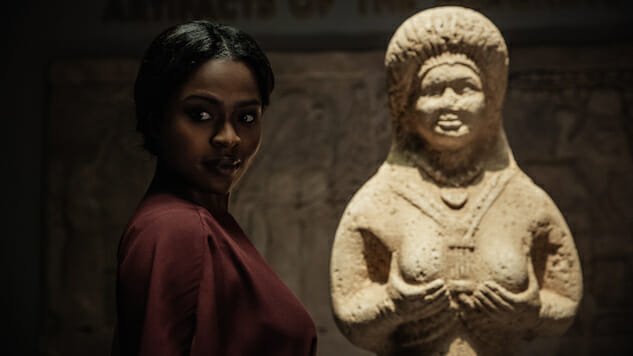The Vast American Gods Will Have the Internet Abuzz About Everything (Except Its Plot)
Starz
You’re almost certainly reading this piece on either a laptop, a tablet, or your smartphone. Good for you that you possess this technology. But also beware, because it’s the latest signal that the new gods are winning the battle for our souls.
“Look at this table, this is an altar to media if I’ve ever seen one,” quips American Gods co-creator Michael Green, eliciting self-conscious laughter from the journalists in attendance at the new Starz series’ New York press event. And he’s right. The assembled members of the media spend the day clacking away at their computers and putting their recording devices in the best possible positions to catch everything the series’ talent says. It’s an altogether fitting experience for covering this adaptation of Neil Gaiman’s beloved 2001 novel, which tells the story of deities old and new as they battle for the soul of America.
For years, people thought the book couldn’t be adapted—according to Gaiman, they got closest to success with HBO in 2011, but things fell through—because American Gods is really more about world-building than strict adherence to plot. The overarching narrative features an ex-convict, named Shadow Moon (played in the series by Ricky Whittle), whose wife dies a few days before he’s scheduled for release. Shadow is recruited by the mysterious Mr. Wednesday (really the Norse god Odin) to serve as his bodyguard and assistant, and it soon becomes clear that Wednesday is preparing for battle. His goal: Rally the fading gods of America’s collective ancestral past against the rising objects of our attention, chiefly Media and Technical Boy (basically the Internet, personified). As Shadow deals with such shenanigans as fighting a real leprechaun in a bar and playing high-stakes checkers against the Slavic god of evil, he must also confront the fact that his wife was not faithful during his prison term.
Gaiman’s novel is a love letter to the patchwork of culture, good and bad alike, that has created the quilt of this country, and the series sticks incredibly faithfully to his version. If anything, it grew closer to the book as production proceeded, and Green and his co-creator, Bryan Fuller (Hannibal), have heeded Gaiman’s input.
“The few times they haven’t listened to me, they’ve had to go back and reshoot, and now they listen to me more,” the author says.
This means a few important things for the series. First and foremost: Boy, is American Gods going to light the Internet on fire, and not just because of its clear support for immigrants’ worth in the Trump era. Even for premium cable television, this show revels in subject matter that will stir up controversy on all ends of the political spectrum. The sight of two Muslim men (one of whom is a djinn) making passionate, tender love in the third episode would instantly incinerate the eyeballs of every Focus on the Family member. Gaiman himself blanched a little writing the version in the novel, and he was surprised that it was reproduced so closely to the letter.
“I got to the point where I’m writing this sequence, I’ve suddenly realized that as a straight white boy I’m gonna have to write hot salesman-on-genie sex,” he recalls. “I remember going, ‘I’m really proud of this chapter… If there’s one thing I’m certain of, it’s that you’re never gonna see that on screen.’ They went there shooting it exactly as written… They didn’t even make up dialogue.”
On the other hand, the horrifying, violent, racially charged ending to the pilot episode will almost certainly inspire a laundry list of think pieces contemplating whether or not Green and Fuller, two white men, even have the right to depict such material.
“We felt it was integral to the book,” Fuller says. “We’re ready to have that conversation… We weren’t just being cavalier about upsetting things.”
As they watched the ending of the premiere, though, Green and Fuller felt they needed to address it immediately at the beginning of the second episode. Hence the appearance of Mr. Nancy (Orlando Jones), the personification of the Ghanaian trickster god Anansi, far earlier in the series than the creators anticipated. In a wonderfully cast show, Jones’ turn is especially inspired, perhaps because Jones grew up with stories of Anansi in his family and understands the comic nature of the trickster god almost innately.
“At the end of the day, you’re a God, you want people to believe,” Jones says. “How are you gonna do that, by yelling? That’s what the con is, the use of that particular tool to get people to do something.”
-

-

-

-

-

-

-

-

-

-

-

-

-

-

-

-

-

-

-

-

-

-

-

-

-

-

-

-

-

-

-

-

-

-

-

-

-

-

-

-








































